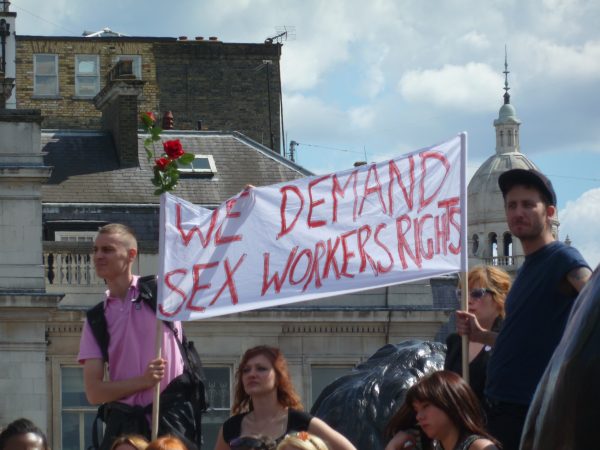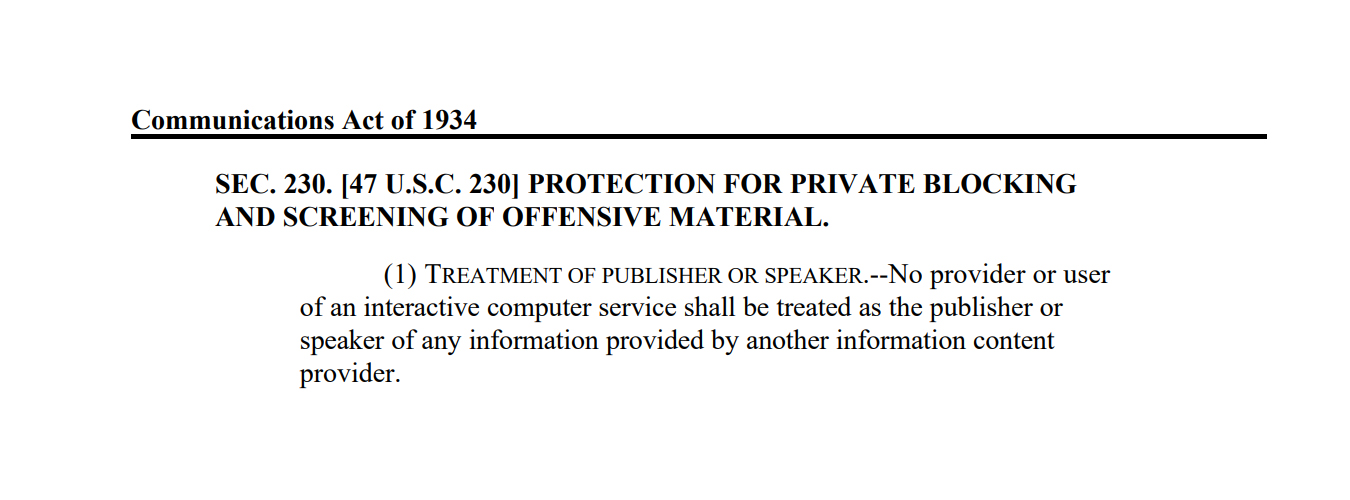
Sex Worker Rights Protest – London SlutWalk 2011 – photo by Ms Mornington – Wiki Media Commons
A guest post by Jackie Harris
For the last 22 years, freedom of expression online in the US has lived happily within “47 U.S.C., the Communications Decency Act,” a piece of legislation whose original purpose was, as suggested by its name, used to restrict free speech on the internet. Oddly enough, within this act passed to restrict free speech, exists the most valuable language to protect our freedom of expression on the internet: Section 230
Section 230 says: “No provider or user of an interactive computer service shall be treated as the publisher or speaker of any information provided by another information content provider.” This means that providers of platforms for user-generated content such as Facebook, Craigslist, YouTube, Tumblr, Twitter, Patreon, etc. could not be held liable for the view of persons who used these outlets to express themselves. Of course, actually breaking the federal criminal law could still be prosecuted (inciting hate crimes, actual sex trafficking, etc.). But Section 230 typically kept these platforms from being liable for their user’s online content.
In April 2018, the set of laws known as SESTA/FOSTA (Stop Enabling Sex Trafficking Act and Fight Online Sex Trafficking Act, respectively) were passed. These laws were signed by President Trump, to ostensibly fight sex trafficking. There are several flavors of the definition of sex trafficking, but all contain wording regarding “sexual exploitation,” usually through means of force, fraud or coercion. Against the recommendation of numerous sex trafficking experts and law enforcement, these bills were overwhelmingly voted into law by members of both the House and Senate. After all, who in their right mind would want to be seen as against stopping sex trafficking?
However, not only have these bills not had the effects intended by this legislation, SESTA/FOSTA have arguably subjected even more people to the dangers of sex trafficking.

How did this happen?
Before SESTA/FOSTA, sex workers used websites in a variety of methods to protect themselves. They were able to do necessary vetting on potential new clients, they communicated with each other regarding potentially dangerous clients, and were able to negotiate their services ahead of time, instead of doing this all in the moment, which can be much more dangerous. But now, in the post-SESTA/FOSTA era, the sites on which sex workers communicated have since shut down due to the real fear that they could be prosecuted for the content generated there.
Sex workers who were previously able to conduct their business in relative safety are now being specifically targeted by pimps and traffickers or treated like criminals themselves even in areas where the sex worker profession is legal. These criminal traffickers are preying on affected sex workers, the same people that SESTA/FOSTA were meant to protect, creating a new class of victims. At the same time, SESTA/FOSTA has eliminated internet platforms that were the very tools used by law enforcement to catch, charge and prosecute online sex traffickers.
In the months following the implementation of SESTA/FOSTA, there were knee jerk reactions by these platforms surrounding their prohibited content rules. They have effectively shut down any expression, conversation and even educational content regarding anything that could possibly be considered sexual in nature. What they now consider “sexual content” is far beyond the average person’s understanding.
Facebook now bans all sexual discussion and groups. Craig’s List removed their personals section altogether. Alternative sexuality groups (LGBTQIA, polyamorous, queer and more) had their community pages completely scrubbed from Tumblr. Gay dating apps such as Grindr, Jack’s and Scruff, now treat the following as “sexual”: kissing, hugging, facial expressions related to sex acts (?), photos in underwear or bikinis. A bikini is now considered sexual content? I doubt this will come as news to Sports Illustrated or Victoria’s Secret…

A post flagged for adult content on Tumblr, after the passage of SESTA/FOSTA.
But why is any of this content considered as prohibited, especially for consenting adults? Is it specifically a result of SESTA/FOSTA? These laws were written with so much ambiguity that the platform providers, out of fear of being shut down or removed from app stores (think Apple App Store or Google Play) are prohibiting any content that could remotely be considered sexual. Frankly, I do not blame them for their fear. These regulations, applying to any content posted on their platforms, would be near impossible to police. And they can be held liable, fined or even prosecuted for said content. Even the much-touted new algorithms being used to scan for such content can’t handle the job, either erroneously tagging content, or letting others slip by that should be prohibited.

Sex Worker Protest – Parliament Square, London July 4th 2018 – photo by David Holt
So what do we do now?
With the passage of SESTA/FOSTA, there exists a mandate that the effectiveness of these regulations must be reported back to the legislature. There are those who are collecting data on the negative repercussions of this set of laws:
- The drop in arrests and convictions of those committing the actual crime of sex trafficking.
- The backlash against those who are posting legal sexual content, such as sex education, information sexual health, resources from breast and gynecological exams.
- Podcasts that have been tagged as sexual
- Artists whose content is thought to be offensive
- Massage therapists, marriage counselors, sex and family therapists have had advertisements promoting their services denied.
People who are completely innocent of sex trafficking have been caught up in this toxic anti-sex zeal. Whose voices will be silenced next? Tactics such as these always affect the most marginalized groups first.
What we have learned is that even with modern communication technology, our senators and representatives pay no attention to social media shouts, even though that is where most people make their voice heard in this 21st century. What they do pay attention to are phone calls, emails, and faxes. So please, contact your legislators.
Let them know of your concern regarding this assault on freedom of expression and speech.
Give voice to the frustration of law enforcement with the demise of the very methods by which most of these criminals were being caught.
If you or anyone you know, have been negatively affected by SESTA/FOSTA, please contact one of the following groups and share your story. We must prove to legislators within the next year that this set of bills have had far-reaching effects upon those whom they never intended.
To help in the fight against SESTA/FOSTA, please consider donating to the following groups;

Jackie Harris is the Secretary of the Board of Directors and the Midwest Polyamory Advocate for the National Coalition for Sexual Freedom.